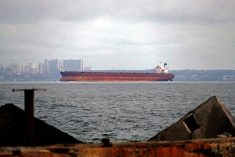The Baltic Dry Index fell to its lowest levels ever on Friday, which bodes well for the competitiveness of Canadian grain exports.
The BDI, a gauge of global ocean freight prices, was quoted Friday at 498 points — the first time the index dipped below 500 since records began in 1985.
The index was trading above 1,200 as recently as the beginning of August, but has found itself in a steady decline over the past three months.
The BDI, compiled daily by the London-based Baltic Exchange, provides an assessment of the price of moving major raw materials by sea, including grain.
Read Also

U.S. grains: Soybeans touch 16-month high, wheat firm on Chinese demand hopes
Chicago soybean futures hit 16-month highs on Monday on expectations China will restart large-scale U.S. soy buying after the two countries reached a deal to de-escalate their trade war.
An overcapacity of ships, a slowdown in Chinese demand for building materials, weakness in crude oil and declining commodity prices have all been cited as contributing factors to the lower freight rates.
As far as Canadian grain and oilseed exports are concerned, the lower freight rates even the playing field in some cases by lessening the importance of shipping costs in the final price to the buyer.
For example, while Australia will always be closer to China than Vancouver, lower freight rates lessen the importance of shipping costs in the final price. — CNS Canada












